Source The Times Of Israel
REPORTER’S NOTEBOOK‘COME, COME, WHOEVER YOU ARE’
During a 10-day annual commemoration ceremony known as the Şeb-i Arus or ‘the night of the union,’ Konya is Turkey’s most buzzing pilgrimage center. This year, ToI was there, too
KONYA, Turkey, Media www.rajawalisiber.com — In the usually sleepy southern Anatolian city of Konya, scenes of colorful people and distinct cultures filled the streets for a few chilly days in mid-December. While usually separated by borders, politics, and language, most were in Konya with one common purpose – paying respect to the late Islamic scholar Rumi and discussing his timeless messages of unity and love.
In December, followers of Jalaluddin Muhammad Balkhi Rumi, or Mevlânâ as he’s known in the East, marked the 749th death anniversary of the 13th-century Persian Sufi thinker, whose influence has transcended borders and ethnic differences and whose teachings are still seen as relevant today, perhaps more than ever.
Addressing reporters in Konya on December 16, Rumi’s 22nd-generation granddaughter Esin Çelebi, who also serves as a teacher of his writings, said she has “visited many countries” to spread Rumi’s ideas and was actively “working with Turkish authorities to introduce [Rumi] to the entire world.”
Noting that Rumi’s books have been translated into 26 languages, she said, “The works of Rumi are still very popular, as if they were just written.”
During a 10-day annual commemoration ceremony known as the Şeb-i Arus or “the night of the union,” Konya becomes Turkey’s most buzzing pilgrimage center. The city, dubbed “the City of Hearts” by locals, draws in thousands or people from across Turkey, Iran, Saudi Arabia, Afghanistan, Tajikistan, Uzbekistan, and other Asian Muslim countries, as well as non-Muslims from the West seeking spiritual enlightenment or simply a unique experience.
The Times of Israel was invited as a guest of the Turkish Culture and Tourism Ministry to report on the events surrounding Rumi’s 749th death anniversary in Konya, Turkey, on December 15-19.

While Rumi’s teachings are inherently based on the Quran, many New Age practices in the West have adopted his ideas as translations have made his work increasingly accessible in recent years. Described by American biographer Brad Gooch as “a poet of joy and of love,” Rumi has become the best-selling poet in the United States today — “the warm and fuzzy ecumenical poet of choice for weddings, coming-of-age ceremonies and funerals,” as the Washington Post put it in 2017.
But despite what some may perceive as cultural appropriation by the West, it’s hard to imagine Rumi himself opposing the circulation of his ideas. One of his best-known quotes reads: “Come, come, whoever you are. Wanderer, worshiper, lover of leaving. It doesn’t matter. Ours is not a caravan of despair. Come, even if you have broken your vows a thousand times. Come, yet again, come, come.”

His ideas emphasize the importance of human dignity and social justice. Some consider him an early defender of human rights. He considered all humans to be manifestations of the divine and as such viewed all people as complex, spiritual, and equal beings. His teachings encourage self-observation and self-discovery as the main ways of reaching spiritual enlightenment and connecting to God.

‘Challenging high politics’
While Rumi’s teachings have always drawn Muslims seeking a different approach to their daily and religious routines, they have also established a foothold in some unexpected places, including the Jewish state.
Dr. Ronie Parciack, a professor at Tel Aviv University’s Department of Asian Studies and for the past seven years an active practitioner of the Mevlevi Sama ceremony — a form of worship in Islamic Sufism that is believed to have started with Rumi — says there is an active community of Israelis who follow Rumi and practice Sama.
“We have a direct link to the Mevlevi order in Konya,” she says in an interview with The Times of Israel after returning from a trip to Turkey with her group.
“The community in Israel is a direct outcome of several historic events,” she explains, citing the establishment of the modern Turkish republic in 1923 and the subsequent banning of Sufi orders by the first Turkish president, Mustafa Kemal Atatürk, in 1925, and the shift of Sufi centers and prominent scholars to the West, primarily the US, in the second half of the 20th century.
Western influence “led to certain changes within the communities,” Parciack says. “For the first time, women started appearing in Sama ceremonies… The presence in the West changed the approach toward gender. It allowed women to enter the ceremony actively while performing publicly.”
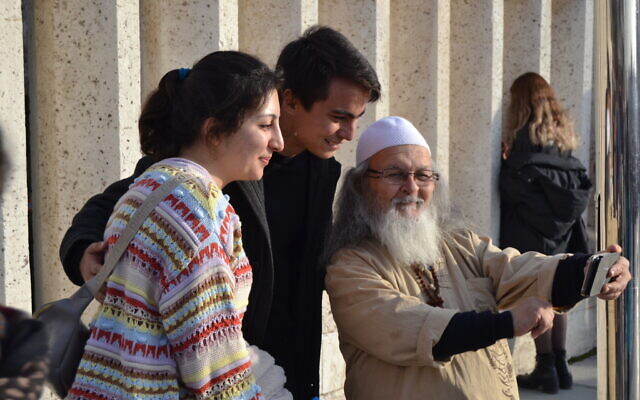
In Turkey, official public Sama ceremonies are still performed by men. Still, Parciack says she was able to perform a private ceremony in Konya and describes a meaningful experience.
We held a ceremony with local Mevlevi Turks. The news of our arrival in Konya spread quickly and drew a lot of curious people, including people from across the Arab world – Emiratis, Saudis, Iranians, Afghans, Iraqis… People came and left, we created a dialogue with them,” she says.
Contrary to what one might expect, Parciack says none of her encounters were political in nature. “In some spaces the meaning we give high politics is overrated. Definitions, political issues, all those were put aside. What was left was the joy of meeting, of talking.”
She continued, “Our presence in Konya created this happy event that challenged concepts of high politics… We’ve become so accustomed to thinking in categories – Muslim, Israeli, Jewish – but it’s not that important… There are plenty of spaces where these levels are completely useless.”
“And that’s one of the purposes of the Sama ceremony,” she says, “to dismiss categories.” She mentions that the group she is part of was established by an Israeli-Palestinian couple, a form of dismissing preconceptions in itself. They meet in Jaffa once a week to practice Sufi whirling.
Other than that, a festival celebrating Rumi and the Sama ceremony is held in Israel every year in May. It has been running for a decade and is gaining popularity every year, according to its website.
And while Sama has allowed Parciack to avoid politics, for a group of young Iranians visiting Konya, the notion of letting go of existing definitions was an expression of seeking justice back home, where nationwide protests have swept the Islamic Republic since the death of Mahsa Amini in the custody of the so-called morality police in mid-September.
“We’re here seeking meaning,” one Iranian who asked not to be identified tells The Times of Israel. “We’re not after any specific person, it’s not about Rumi or [prophet] Muhammad. It’s only about us, the people, those looking for justice and trying to follow their heart.”
Another member of the group adds, “When you connect with your heart everything becomes a reflection of love and you can love everything.”
Someone from the group, meanwhile, hands out flyers with a symbol of what he calls “Derafsh Kaviani,” a banner of the Sassanid Empire, officially known as the Empire of Iranians, which was the last Iranian empire to rule before the Muslim conquests during the 7th and 8th centuries CE.
“It’s the oldest flag of Iran,” he says.
Sufi whirling
Sufi whirling is at the center of the Sama. It is performed by Dervishes – a broad name given to members of an Islamic Sufi group. The ceremony is considered the means through which its performers shed their ego and any existing preconceptions to reach a state of mind that illuminates their connection with Allah. The Sama, which literally means “hearing” in Arabic, also includes repeated chants of certain prayers and phrases from the Quran – referred to as Dhikr, or “remembrance” – that accompany the ceremony.
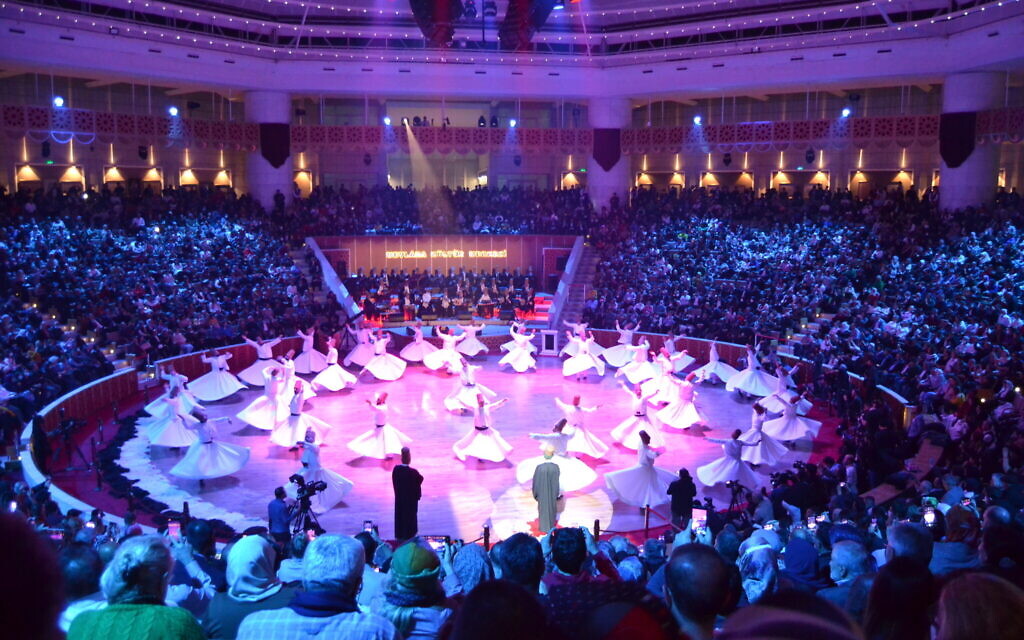
Despite seeming like an ecstatic dance to the untrained eye, those who practice Sama describe it more as a prayer that requires a great level of self-discipline and control.
Many people today know Sama as a dance, as a show, but it’s not. It’s a prayer, it’s the remembrance of God,” Turkish Mevlevi Dervish Osman Sariaj tells The Times of Israel.
Sariaj says the unique position whirling Dervishes put themselves in during the ceremony – holding one hand toward the sky and the other toward the ground while tilting their head sideways – reflects its meditative and religious purpose.
“All people want something from God. We also want something. But we don’t look at what he gives us. Our head position means that we don’t look up or down. The other hand is pointed down, we’re not looking at what we give others as well. We only look toward our hearts, inward,” he says, reiterating Rumi’s saying: “Only from the heart can you touch the sky.”
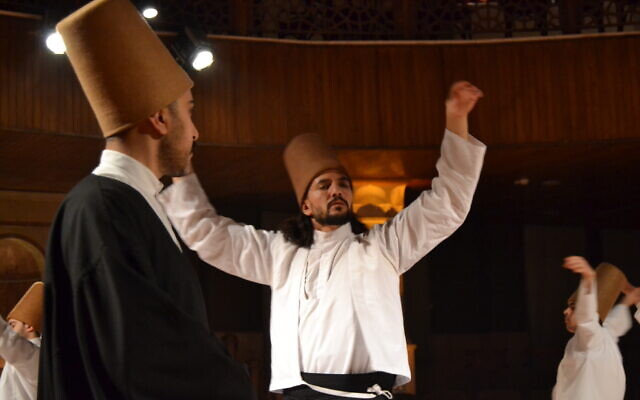
Asked if anyone can tap into these ideas through the Sama, Sariaj says all are all welcome to try.
“I practiced a single movement with my leg for six months, just one turn,” he says.
“Religion is not important. Just come and visit Rumi. Close your eyes and feel him. If you do that you’ll be rewarded,” he guarantees.
Still, it might not be for everyone, Parciack says.
“Religion is not important. Just come and visit Rumi. Close your eyes and feel him. If you do that you’ll be rewarded,” he guarantees.
Still, it might not be for everyone, Parciack says.
“Learning how to master the act of whirling takes time. The technique requires changing one’s sensory perception… It requires a very specific kind of passion. Anyone can come and try it, but I’ve seen many try and fail to stick with it.”
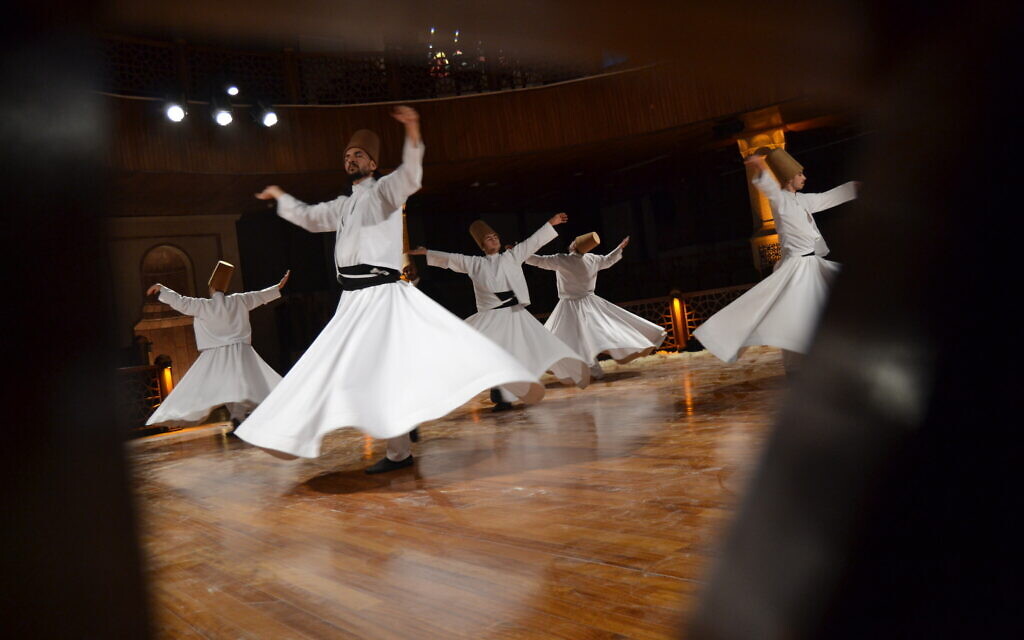
Sufism in Jewish tradition
A Jewish sect that was active in Egypt in the 12th-13th centuries and was led by Abraham Maimonides, the son of noted sage Maimonides, is believed to have integrated Islamic Sufi ideas of the time into their practices. They have been referred to as Hasidic Egyptians by some scholars, raising interesting albeit completely theoretical questions about the possible influence of Islamic Sufism on the development of the present-day Hasidic movement which, like Mevlevi Dervishes, puts an emphasis on the individual’s state of mind during the process of worship, with happiness and joy playing a central role in religious practices. Song and dance are central in Hasidic tradition, not unlike the Sama ceremony in Mevlevi Sufism.
According to Dr. Michael Laitman, founder and president of the Bnei Baruch Kabbalah Education & Research Institute, the connection between Sufism and Jewish mysticism is biblical.
“Both Sufism and the wisdom of the Kabbalah speak about the same thing. They both originated from Abraham. He taught Sufism as spiritual teachings to his eldest son Ishmael and the wisdom of Kabbalah to his other son, Isaac. But both practices are connected, they don’t contradict each other,” Laitman says.
Today, these ideas are carried on by a group of academics, rabbis, and sheiks who call themselves “Derech Avraham” (Abraham’s Journey). The group promotes interfaith dialogue based on common ideas and practices from Judaism and Islam. Its goal, according to its website, is to “facilitate a reunion of Isaac & Ishmael – the nations of the Middle East – that will build a highway to bless the nations.”
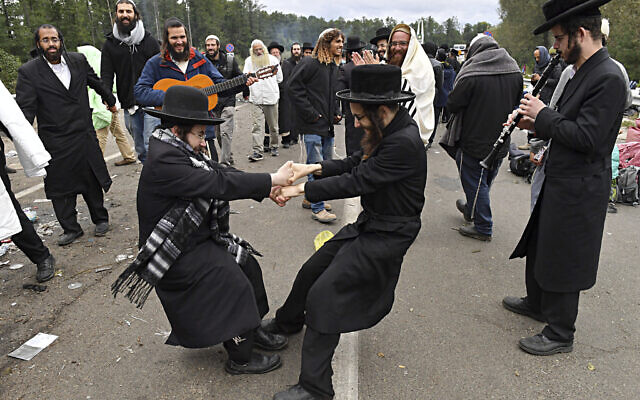
‘Spreading this message to the entire world’
Addressing the crowd at the main event commemorating Rumi in Konya on December 17, Turkish officials argued that Rumi’s ideas were necessary in today’s world more than ever.
“[Rumi’s] teachings are crucial values for humanity and the world is starting to realize this,” said Konya Governor Muammer Erol.
“It’s no trivial thing that [Rumi] is read with the same excitement as he was hundreds of years ago,” said Turkish Culture and Tourism Minister Mehmet Nuri Ersoy.
“And that’s the line that connects us all. We don’t discriminate. We are always seeking to cooperate with our neighbors. We don’t consider those who think and live differently as enemies. These values are needed in today’s world. So many people are on the verge of starvation, many are migrating, and we see endless forms of discrimination… Certain things have to change and [Rumi] had the answer for what we need – love. It is the sigil of humanity. We are proud to be taking an active role in spreading this message to the entire world,” he added.
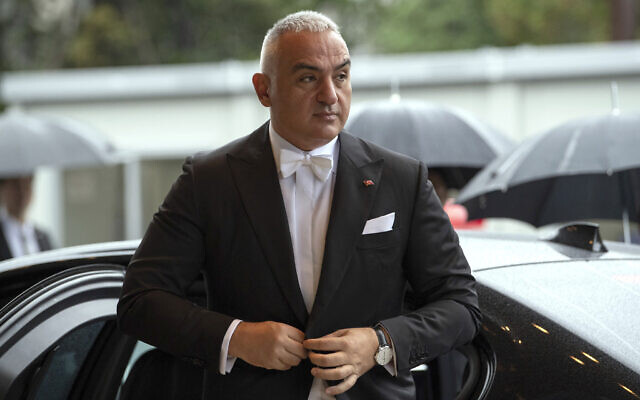
Turkish President Recep Tayyip Erdogan was among several world leaders to send Hanukkah greetings to the Jewish people earlier this month, as the ties between Jerusalem and Ankara have improved in recent months.
As Israel seeks to foster more normalization agreements with its Muslim neighbors, Konya, Rumi, and the spirit they represent suggest that regional harmony is not only possible but an emerging reality, and only requires us to look in the right direction.
Or as Rumi put it: “Your task is not to seek for love, but merely to seek and find all the barriers within yourself that you have built against it.”
